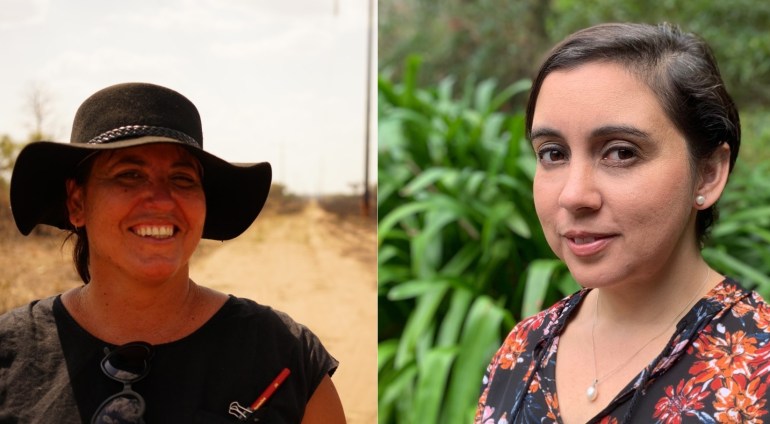Jub Clerc and Kodie Bedford.
Capitalising on the significant gains made by Indigenous screen storytellers over the past few years, Kodie Bedford wants to see more Indigenous writers emerging this year – and more respect accorded to Indigenous writers.
Fellow Indigenous filmmaker Jub Clerc suggests film schools should implement further Indigenous content protocols as part of their classes so graduates can make informed, inclusive and creative choices when they enter the industry.
“Indigenous voices have enjoyed a bumper few years as our stories have reached far and wide and the amount of exciting emerging Indigenous talent coming through is remarkable,” says Bedford, whose screenwriting credits include Mystery Road, Grace Beside Me, Robbie Hood and the horror short Scout commissioned by Screen Australia and the ABC, which was her directing debut.
“Of course I would love to see more of it, especially diversity across Indigenous voices, sexual orientation, gender identity, people with disability and new voices. There are more stories than just the stereotypical native tropes of standing on a cliff, wind in hair, singing songs.”
Bedford hails Bunya Productions’ Mystery Road, producer Majhid Heath’s horror anthology Dark Place, Steven Oliver’s webseries A Chance Affair and Nakkiah Lui’s Kiki and Kitty as examples of shows which demolish preconceived notions of what makes a story Indigenous.
A year ago Clerc told IF she was hoping for a year of significant change as the terms collaborator or co-producer rather than consultant would be widely adopted for Indigenous practitioners.
“Fantastically enough, the year has panned out the way I’d hope in relation to the use of collaborator in place of consultant,” says Clerc, who joined the roster of directors on the second season on Matchbox Pictures/For Pete’s Sake Productions’ The Heights.
“I have found that most companies are more than happy for that level of collaboration. The great thing is that if they are not, we have been able to establish that from the get go and avoided any complications down the track. Funding bodies have also been on board in a fantastic way to ensure this is implemented in their criteria.”
Clerc had a ball on The Heights, shooting up to 10-15 minutes a day, keeping an eye on four split screens and sometimes taking 45 minutes to shoot a one-minute scene.
“It has to be, with those sorts of time limits, a beautiful, well-choreographed dance and everyone had their dancing shoes on,” she laughs. “I learnt it is a very different beast to feature films or 6×1 hour TV but I found that implementing what I learnt from both was what saw me through my first TV directing credit.”
‘The Heights.’
Despite the growing chorus of Indigenous voices, Bedford sometimes finds she is still the only Indigenous person in the writers room, which makes it tough her to be able to answer every question that may crop up about Indigenous peoples, culture and history.
“Having more Indigenous voices in the room will give the story more diversity, complexity and richness,” she says. “The positive thing is I am seeing the shift in this so it is happening – I’m confident the momentum will keep going in 2020.
Women are still under-represented in some sections of the industry, particularly feature directors, and Clerc believes an unconscious bias is a factor.
“I absolutely love my mates, fellow male practitioners that are killing it in the industry so I’d hate to think how many of them are crippled, as I once was, by unconscious bias,” she says.
“Next time you’re asked to recommend someone, stop for a second and make a difference, recommend a fellow female colleague. We are all so quick to say ‘I know this great guy who’d be awesome for the job,’ when we also know a million EQUALLY awesome women who’d be just as amazing if we just diminish our knee jerk reaction to recommend a guy.”
This is an exciting year for Bedford. Her first play, Cursed!, which was inspired by the gathering of her family in Geraldton a couple of years ago when her grandmother was dying, will premiere at the Belvoir in October.
Among the projects she is developing, Rough is a series which looks at working class women who work in a brothel, in collaboration with Noble Savage Pictures’ Majhid Heath and Hayley Johnson. They will start pitching the show as soon as she finishes the bible with Screen Australia’s support.
Clerc is heading to Los Angeles in March to meet with Truant Pictures’ vice presidents of development and production Toby Nalbandian and Greg Schmidt, for whom she is developing The Gooynboon, a spin-off of her first short Storytime, which followed two adventurous Kimberley kids who wander deep into the mangroves at sunset and encounter a terrifying woman.
She is also planning meetings and workshops on other potential collaborations and will then resume work on Sweet As (working title), a coming-of-age movie with Arenamedia’s Liz Kearney.
“I also have a couple of writers room this year, including one in February, for some pretty interesting projects. So 2020 is looking pretty amazeballs so far,” she says.



